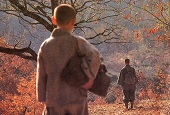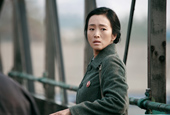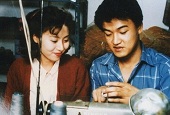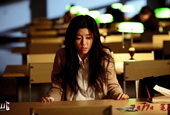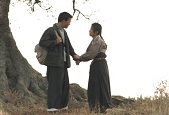Deep Blue Night (1985)
Directed by Bae Chang-ho
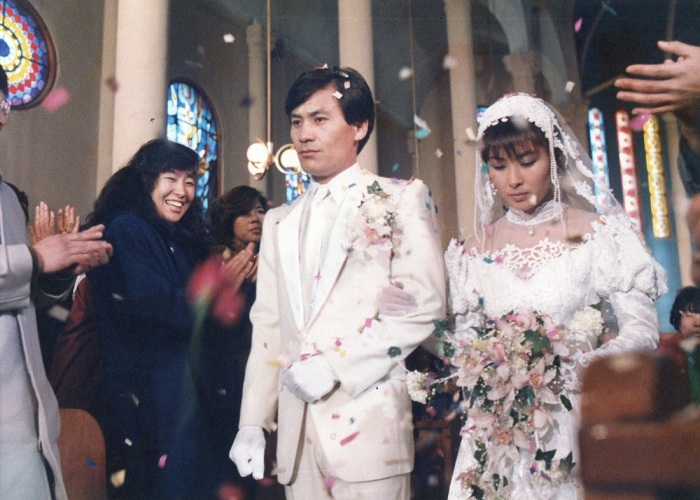
Comment by film critic Shin Eun-sil
Since August 15, 1945, the influence of the U.S. has existed almost everywhere in Korean society. Not to mention politics, business or the military, Korea has been culturally and in terms of education under the influence of the U.S., as well as in terms of academia, technology, religion and medicine. The U.S. is the standard for us to reach. Many of those who consider the U.S. to be some kind of true heaven, or those who thirsted for freedom under Korea's military dictatorship, decided to emigrate to the U.S. It was the U.S., however, that supported the military dictatorship, established with two coups d'état.
Since the Gwangju Democratization Movement in 1980, however, Korea started to rethink itself. There was an attempt to set fire to the American Cultural Service building in Busan in 1982, and there was a stay-in strike around the American Cultural Service building in Seoul in May 1985.
"Deep Blue Night" creates an atmosphere that is different from movies produced up until the 1970s.
Most of those movies, up until then -- including "The Flower in Hell" in 1958 and "Three O'Clock P.M. In a Rainy Day" in 1959 -- had a tendency to portray the U.S. as something like a stain that was left by the Korean War. However, "Deep Blue Night," shot in LA, pictured a feasible story set in the Korean community in California.
"First, I had a desire to expand the scope of material and background of the movie," said Director Bae. "Also, personally, I wanted to talk about the fantasy that people have in their minds about the U.S. as I watched a bunch of people snake down the long queue in front of the U.S. Embassy for a visa."
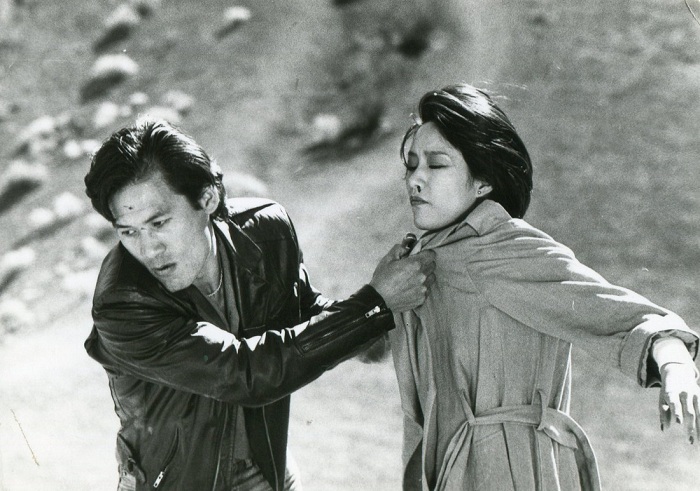
Released at the Korea Myungbo Theater on March 1, 1985, "Deep Blue Night" attracted more than 600,000 viewers, breaking box office records. It also received many awards on both domestic and international stages, including the Grand Bell Film Award, the Paeksang Arts Award and an Asia Pacific Screen Award.
With the success of a series of films, after his debut work "People in the Slum" released in 1981 through to "Flower at the Equator" in 1983, "Whale Hunting" in 1984 and "The Winter That Year Was Warm" in 1984, director Bae has been nicknamed the "Spielberg of Korea." He was a star director. When he released a new movie, his portrait was put up alongside the movie poster on the main signboards in the theater.
Bestselling author Choi In-ho contributed to two of those productions, "Flower at the Equator" and "Whale Hunting." His short novel of the same title has nothing to do with this movie. The novel by which director Bae was inspired and upon which it was based was the full-length novel "Desert on Top of Water" (unofficial translation).
In Choi's original scenario, there was no famous scene shot in Death Valley. The personalities of the characters were different, too. Jane was described by Choi as a woman with strong sexual passions. While Paek watched an erotic movie in the living room, she lay naked in her bedroom letting her cat lick her body, criticizing his rejection of her love.
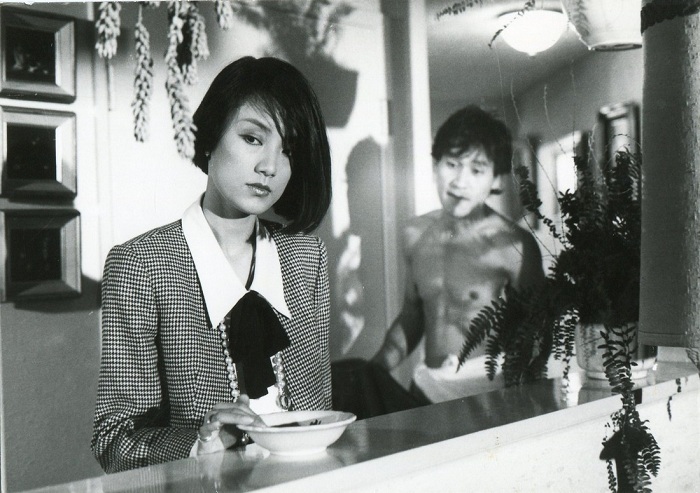
The Jane created by director Bae is a little different. Entrapped in a deep loneliness, this Jane spends the night together with him and then falls in love with Paek, but she can still be cold. Wearing protective defensive armor, she stands being in the desert, that is, being in the U.S. She has a sense of eternal love that seems quite distant from the secular world.
Previously, a film critic compared the ending of this movie with that of "China Town," released in 1974. The two characters -- Faye Dunaway in "China Town" and Jang Mi-hee in "Deep Blue Night" -- decide to fire a gun, to reveal their inner existence. Jang's excellent act adds to the mood in the scenes shot at the beach and in bed, with Bae's signature technique of 360 degree rotations and nightscape scene captured in a point-of-view shot.
The background music includes the "Theme of Jane," which shows emotion for a female protagonist, and "American Dream," which sings of the vanity of life. The soundtrack is produced by Jung Seong-jo. The music has been loved ever since, played on radio stations as recently as autumn of 2013.
Jung produced a number of hit songs, including "To You," sung by Jeong So-ra, the main background song featured in "Yesterday's Rain" (1974), and "Wangshimni" (1976). He has been recognized as a celebrated master of cinematic music. Cooperation between the duo, Jung and Bae, continued in many other films: "Our Joyful Young Days" in 1987, "Hello, God" in 1987, "Dream" in 1990 and "Stairway to Heaven" in 1991.
Director Jang Gil-su, known for his many productions that highlight the "America inside us," asked Jung to work with him to produce the soundtrack for "America America" released in 1988. It doesn't seem to be a coincidence.
* This series of articles has been made possible through the cooperation of the Korean Film Archive.
*Click here to see previous parts in the series about Korea.net's must-see films.
Directed by Bae Chang-ho
Paek Hobin, played by Ahn Sung-ki, is an illegal immigrant in the U.S. He is determined to do anything for money, in order to bring his pregnant wife from Korea to the U.S.
In San Diego, however, he is dating a Ms. Han, played by Choi Min-hee. Paek convinces her to move to Los Angeles with him and on the way, he deprives her of her money and runs away, leaving her behind in the desert.
Meanwhile, Jane, played by Jang Mi-hee, comes to the U.S. with her husband, a U.S. soldier stationed in Korea. She ends up divorcing him, however, as she can't stand his physical violence or the loneliness. Now, she makes a living through sham marriage contracts.
Paek decides to enter into a sham marriage with Jane. After many attempts at winning her favor and passing the strict interviews, Paek finally achieves U.S. citizenship. He is excited very much at the thought that he can now divorce Jane and bring his original wife to California. Unlike him, however, Jane seems to love Paek and doesn't want to let him go. Jane tells him that she is pregnant.
Things get more complicated when Ms. Han, who he left in the desert, finds him. Paek convinces Jane, this time, to move further north to San Francisco. He attempts to kill her near a valley in the desert. Jane tells the truth, that she is not pregnant, and Paek, relieved, suggests she file for divorce with him. Before he starts the car engine, Jane gives him a tape recorded message sent by his wife. On the tape, she says that she is now tired of him and has already gone through with an abortion.
Trembling with rage, Paek starts the car. Jane then shoots him with a gun and then shoots herself in the head, too.

Comment by film critic Shin Eun-sil
Since August 15, 1945, the influence of the U.S. has existed almost everywhere in Korean society. Not to mention politics, business or the military, Korea has been culturally and in terms of education under the influence of the U.S., as well as in terms of academia, technology, religion and medicine. The U.S. is the standard for us to reach. Many of those who consider the U.S. to be some kind of true heaven, or those who thirsted for freedom under Korea's military dictatorship, decided to emigrate to the U.S. It was the U.S., however, that supported the military dictatorship, established with two coups d'état.
Since the Gwangju Democratization Movement in 1980, however, Korea started to rethink itself. There was an attempt to set fire to the American Cultural Service building in Busan in 1982, and there was a stay-in strike around the American Cultural Service building in Seoul in May 1985.
"Deep Blue Night" creates an atmosphere that is different from movies produced up until the 1970s.
Most of those movies, up until then -- including "The Flower in Hell" in 1958 and "Three O'Clock P.M. In a Rainy Day" in 1959 -- had a tendency to portray the U.S. as something like a stain that was left by the Korean War. However, "Deep Blue Night," shot in LA, pictured a feasible story set in the Korean community in California.
"First, I had a desire to expand the scope of material and background of the movie," said Director Bae. "Also, personally, I wanted to talk about the fantasy that people have in their minds about the U.S. as I watched a bunch of people snake down the long queue in front of the U.S. Embassy for a visa."

Released at the Korea Myungbo Theater on March 1, 1985, "Deep Blue Night" attracted more than 600,000 viewers, breaking box office records. It also received many awards on both domestic and international stages, including the Grand Bell Film Award, the Paeksang Arts Award and an Asia Pacific Screen Award.
With the success of a series of films, after his debut work "People in the Slum" released in 1981 through to "Flower at the Equator" in 1983, "Whale Hunting" in 1984 and "The Winter That Year Was Warm" in 1984, director Bae has been nicknamed the "Spielberg of Korea." He was a star director. When he released a new movie, his portrait was put up alongside the movie poster on the main signboards in the theater.
Bestselling author Choi In-ho contributed to two of those productions, "Flower at the Equator" and "Whale Hunting." His short novel of the same title has nothing to do with this movie. The novel by which director Bae was inspired and upon which it was based was the full-length novel "Desert on Top of Water" (unofficial translation).
In Choi's original scenario, there was no famous scene shot in Death Valley. The personalities of the characters were different, too. Jane was described by Choi as a woman with strong sexual passions. While Paek watched an erotic movie in the living room, she lay naked in her bedroom letting her cat lick her body, criticizing his rejection of her love.

The Jane created by director Bae is a little different. Entrapped in a deep loneliness, this Jane spends the night together with him and then falls in love with Paek, but she can still be cold. Wearing protective defensive armor, she stands being in the desert, that is, being in the U.S. She has a sense of eternal love that seems quite distant from the secular world.
Previously, a film critic compared the ending of this movie with that of "China Town," released in 1974. The two characters -- Faye Dunaway in "China Town" and Jang Mi-hee in "Deep Blue Night" -- decide to fire a gun, to reveal their inner existence. Jang's excellent act adds to the mood in the scenes shot at the beach and in bed, with Bae's signature technique of 360 degree rotations and nightscape scene captured in a point-of-view shot.
The background music includes the "Theme of Jane," which shows emotion for a female protagonist, and "American Dream," which sings of the vanity of life. The soundtrack is produced by Jung Seong-jo. The music has been loved ever since, played on radio stations as recently as autumn of 2013.
Jung produced a number of hit songs, including "To You," sung by Jeong So-ra, the main background song featured in "Yesterday's Rain" (1974), and "Wangshimni" (1976). He has been recognized as a celebrated master of cinematic music. Cooperation between the duo, Jung and Bae, continued in many other films: "Our Joyful Young Days" in 1987, "Hello, God" in 1987, "Dream" in 1990 and "Stairway to Heaven" in 1991.
Director Jang Gil-su, known for his many productions that highlight the "America inside us," asked Jung to work with him to produce the soundtrack for "America America" released in 1988. It doesn't seem to be a coincidence.
* This series of articles has been made possible through the cooperation of the Korean Film Archive.
*Click here to see previous parts in the series about Korea.net's must-see films.
